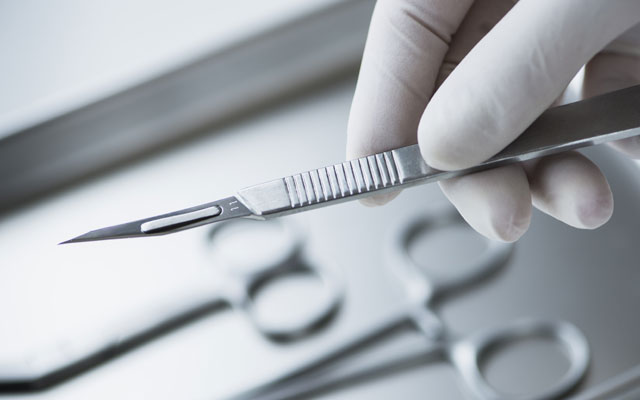
Carnal Knowledge
In the last column we took on the myths surrounding vaginal health and cleanliness. We’re equal opportunity writers, so now we turn to the penis, because how many times have you heard someone describe an uncircumcised penis as “gross” or “dirty?”
There might not be special soaps and cleansers for men (there isn’t a male equivalent to Summer’s Eve – Summer’s Adam?- as far as we can tell) but intact men can face the same damaging messages women have heard about their genitals: that they’re dirty, smelly, or weird-looking.
I never really knew how damaging these messages could be until a friend of mine who is a newly-minted doctor told a group of us about a fourteen year old who showed up in the ER after cutting off his own foreskin with a pair of scissors.
We think it goes without saying that no one should ever be made to feel that ashamed of a body part, especially when its based off of myths and loose medical arguments.
We can get to a place where we’re not making fun of someone’s genitals by understanding what it is we’re looking at and why its a normal part of the body.
The foreskin actually serves a purpose. It protects the head of the penis which is very sensitive, helps with lubrication for sex, and can add increased sexual sensation. Just like the vagina produces discharge, the foreskin produces smegma – and this where the bulk of negative messages about being uncircumcised derive.
Smegma is a mix of oils, moisture, and dead skin cells. It is as natural as vaginal discharge is. It helps the foreskin slide back and forth over the head and assists with lubrication.
Smegma builds up every day, so it is important to clean the penis daily and after sex or masturbation.
All you need to do is pull back the foreskin so the head is exposed and wash with warm water–that’s it.
With the practice of proper hygiene, smegma should not cause a foul odor. Poor hygiene can lead up to a buildup of bad bacteria that will require medical attention.
It’s safe to say an uncircumcised penis is no less clean than one that is, it just requires a little more attention to detail.
The belief that intact penises are dirty also, stems from studies that have shown circumcision reduces the risk of STIs and HIV. It is important to realize that the same reduction in risk for STIs and HIV can be achieved by – drumroll please – washing up after sex.
We hope we didn’t disappoint anyone but having a circumcised penis doesn’t make you a magical STI and HIV resistant demi-god. The bottom line is if you’re not practicing safer sex, you’re at risk of STIs and HIV, cut or uncut.












Hugh7 • Feb 21, 2015 at 6:04 pm
“It is important to realize that the same reduction in risk for STIs and HIV can be achieved by – drumroll please – washing up after sex.”
WOAH! While this is probably true, the reduction is probably much less than cutting-advocates think, maybe even zero. Don’t let anyone think that washing up after sex (or genital cutting) offers any useful protection against HIV. Condoms, condoms, condoms.
TLCTugger • Feb 21, 2015 at 12:46 pm
I’m not smegma-phobic, but this well-intentioned article completely mischaracterizes smegma.
It DOES NOT lubricate sex or the gliding of the skin tube. The slinking SKIN TUBE does that. It’s a rolling bearing that is just really hard to explain to folks who haven’t had the chance to handle a foreskin.
Smegma IS NOT produced by the foreskin. It is the result of sloughed off skin cells (which even females and foreskin-less males slough off). It simply accumulates for those who do not wash it away. It doesn’t “build up” every day. You’d have to fail to wash for days to see any.
The normal male genitals are almost exactly as maintentance-free as normal female genitals.
Mark • Feb 21, 2015 at 12:07 pm
Thank you for writing about this subject in a factual and balanced way. The rest of the world outside the United States does not practice circumcision on infant males. It continues in this country largely out of ignorance. Recently, an international alliance of health professionals from various national pediatric organizations condemned the continued practice of male circumcision in the US. It is seen as out of step with the rest of the developed world. Sadly, money is probably the main reason it continues to be done. A circumcising nurse or doctor will tell expecting parents it is not needed, but won’t tell them about either the functions of the foreskin or what is lost. Articles like yours help to shed some light on a subject – the foreskin, and a practice – circumcision, that has been taboo to discuss before. Ignorance is not bliss, it can often be harmful, especially in the case of infant non-consensual circumcision.
http://pediatrics.aappublications.org/content/early/2013/03/12/peds.2012-2896
Roland Day • Feb 21, 2015 at 11:39 am
One should point out that urine is nothing more than some chemicals that are the product of metabolism dissolved in sterile water.
Urine may be used to flush out and clean the foreskin.
Moreover, the foreskin has numerous immunological functions that protect the human body from disease.
ml66uk • Feb 21, 2015 at 8:23 am
Women produce more smegma than men, and their genitals are harder to clean, but we don’t cut parts off baby girls to make it easier.
In Europe, almost no-one circumcises unless they’re Jewish or Muslim, and they have lower rates of all the bad stuff. A 29 year study of males in New Zealand showed a slightly *higher* rate of STI’s among circumcised men. There are at least two studies showing lower rates of STI’s among circumcised women btw, but again, that doesn’t justify genital surgery on girls.
The foreskin isn’t just there to protect the glans. Mine contains the most sensitive parts of my penis, and I’d pay a year’s salary rather than have it cut off. That little bit of skin makes a big difference.